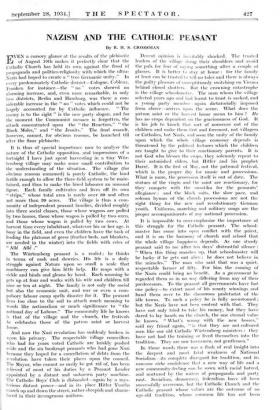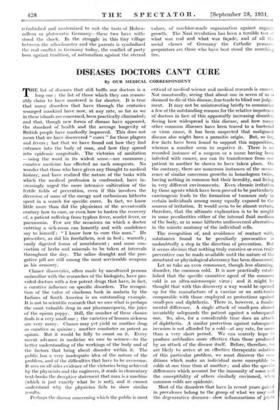NAZISM AND THE CATHOLIC PEASANT
By R. H. S. CROSSMAN EVEN a cursory glance at the results of the plebiscite of August 19th makes it perfectly clear that the Catholic Church has held its own against the flood of propaganda and politico-religiosity with which the ultra- Nazis had hoped to create a " true Germanic unity." In every predominately Catholic district—Cologne, Coblenz, Franken for instance—the " no " votes showed an alarming increase, and, even more remarkable, in only two districts, Berlin and Hamburg, was there a con- siderable increase in the " no " votes which could not be largely accounted for by Catholic influence. " The enemy is to the right " is the new party slogan, and for the moment the Communist menace is forgotten, the attack concentrated upon the " the Reaction," " the Black Moles," and " the Jesuits." The final assault, however, cannot, for obvious reasons, be launched till after the Saar plebiscite.
It is thus of special importance now to analyse the nature of the Catholic opposition, and impressions of a fortnight I have just spent harvesting in a tiny Win.- temberg village may make some small contribution to the understanding of the situation. The village (for obvious reasons unnamed) is purely Catholic, the land fertile enough to allow the three-field system to be main- tained, and thus to make the hired labourer an unusual figure. Each family cultivates and lives off its own " strips," whose total area is rarely over 80 and often not more than 80 acres. The village is thus a com- munity of independent peasant families, divided roughly into three social classes, those whose wagons are pulled by two horses, those whose wagon is pulled by two oxen, and those whose wagon is pulled by two cows. At harvest time every inhabitant, whatever his or her age, is busy in the field, and even the children have the task of leading the platoons of geese (feather beds, not blankets, are needed in the winter) into the fields with cries of " Alle All ."
The Wfirtemberg peasant is a realist; he thinks in terms of cash and dowries. His life is a daily struggle against Nature upon so small a scale that machinery can give him little help. He reaps with a sickle and binds and gleans by hand. Each morning he gets up at four and works with his wife and children till nine or ten at night. The family is not only the social but also the economic unit, and war or even a com- pulsory labour camp spells disaster for it. The peasant lives too close to the soil to attach much meaning to words like nationalism or much significance to " the national day of Labour." The community life he knows is that of the village and the church, the festivals he celebrates those of the patron saint or harvest home.
And now the Nazi revolution has suddenly broken in upon his privacy. The respectable Village councillors who had for years voted Catholic are briskly pushed aside and the six bankrupt peasants who had gone Nazi because they hoped for a cancellation of debts from the revolution have taken their places upon the council. The Mayor, who cannot so easily be got rid of, has been relieved of most of his duties by a Peasant Leader appointed by a distant and unknown party machine. The Catholic Boys' Club is disbanded—again by a mys- terious distant power—and in its place Hitler Youths march up and down the street, rather sheepish and shame- faced in their incongruous uniform. Decent opinion is inevitably shocked. The trusted leaders of the village shrug their shoulders and avoid the pub. for fear of saying something after a couple of glasses. It is better to stay at home : for the family at least can be trusted to tell no tales and there is always the guilty pleasure of surreptitiously switching on Vienna behind closed shutters. But. the crowning catastrophe is the village schoolmaster. The man whom the village selected years ago and had learnt to trust is sacked, and a young party member—again dictatorially imposed from above—arrives upon the scene. 'What does the patron saint or the harvest home mean to him ? Ile has no crops dependent on the graciousness of God. It is his job to knock that sort of nonsense out of the children and make them first and foremost, not villagers or Catholics, but Nazis, and soon the unity of the family upon which the whole village economy depends is threatened by the political lectures which the children are taught to give to their reactionary parents. It is not God who blesses the crops, they solemnly repeat to their astonished elders, but Hitler and his prophet Darre. It is the first of May, not the patronal festival, which is the proper day for music and processions. What is more, the procession itself is out of date. The statues of the virgin and the saint are reactionary, for they compete with the swastika for the peasants' allegiance : and the black suits, the slow pace, and solemn hymns of the church processions are not the right thing for the new and revolutionary German youth. Uniforms, marching and military songs are the proper accompaniments of any national procession.
- It is impossible to over-emphasize the importance of this struggle for the Catholic peasant. The school- master has come into open conflict with the priest, and it is on the harmony of church and school that the whole village happiness depends. As one sturdy peasant said to me after ten days' distrustful silence : " When this thing smashes up, that schoolmaster will be lucky if he gets out alive : he does not believe in the miracles." The man who said that was a quiet, respectable farmer of fifty. For him the coming of the Nazis could bring no benefit. As a government he regarded them as in no way differing from any of their predecessors. To the peasant all governments have but one policy—to extort most of his scanty winnings and hand them over to the clamorous proletariat of the idle towns. To such a policy he is fully accustomed ; but the Nazis have not been content with that. They have not only tried to take his money, but they have dared to lay hands on the church, the one eternal value he knows. " What's wrong with 'the new bosses," said my friend again, " is that they are not cultured men like our old Catholic Wurtcmberg ministers : they have not had the training or lived themselves into the tradition. They are raw townsmen, not gentlemen."
In those words there was a flash of real insight into the deepest and most fatal weakness of National Socialism—its complete disregard for tradition, and its nouveau riche confidence that a new way of life and a new community-feeling can be sown with racial hatred, and nurtured by the waters of propaganda and party rant. Socialism, democracy, federalism have all been successfully overcome, but the Catholic Church and the Catholic peasant whose values are the outcome of an age-old tradition, whose common life has not been refurbished and modernized to suit the taste of Hohen- zollern or plutocratic Germany—these two have with- stood the shock. In the struggle in this tiny village between the schoolmaster and the parents is symbolized the real conflict in Germany today, the conflict of party boss against tradition, of nationalism against the eternal values, of machine-made organization against organic growth. The Nazi revolution has been a terrible test of what was real and what was façade, and of all the social classes of Germany the Catholic peasant- proprietors are those who have best stood the scorching fire.



















































 Previous page
Previous page